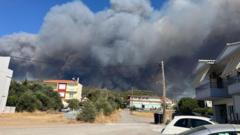How Should You Plan if Wildfires Disrupt Your Holiday Destination?

Understanding Travel Safety Amid Wildfires in Europe
This summer has brought unprecedented heat and alarming wildfires to several regions in Europe, including Greece, Turkey, and France. With temperatures soaring to record highs, many travelers are understandably concerned about their upcoming vacations. This article aims to address these concerns, providing clarity on travel safety, insurance coverage, and what to do if your plans have been impacted by wildfires. By the end of this piece, you will have a better understanding of your options as a traveler amidst these challenging circumstances.
Current Situation: Wildfires and Heatwaves
Europe is facing a significant crisis with wildfires due to a combination of extreme heat and dry conditions. For instance, Turkey recorded a staggering 50.5°C in Silopi, while Athens and Cyprus saw temperatures rise to 44°C. The situation has become dire enough that the European Commission has reported over 290,000 hectares burnt this year, which is more than double the area affected at the same time last year. Destinations like Rhodes, Crete, and the Balkans have been hit particularly hard, leading to emergency evacuations and travel disruptions.
Is It Safe to Travel?
The Foreign Office maintains that it is safe to travel to affected areas, but this can vary greatly depending on the proximity of wildfires and the specific conditions on the ground. If you have a holiday booked, it's essential to stay updated on the latest travel advisories and local conditions. Monitoring news and governmental updates can help you make informed decisions regarding your travel plans.
Your Options if You’re Worried About Wildfires
If you're feeling uneasy about your holiday due to the threat of wildfires, there are several options to consider:
- Contact Your Airline or Hotel: If wildfires are near your destination, reach out to your airline or hotel for potential solutions tailored to your situation.
- Travel Insurance: Review your travel insurance policy to see if it covers natural disasters like wildfires. Some policies may allow for additional coverage for such events.
- Cancellation Policies: Familiarize yourself with the cancellation policies of your travel provider. If they cancel your booking, you may be eligible for a refund.
Understanding Travel Insurance and Coverage
Travel insurance can be a lifesaver in situations like these. Most policies cover cancellations or disruptions caused by natural disasters, including wildfires. However, there are some key points to keep in mind:
- Official Travel Advisories: To file a successful claim, there generally needs to be an official warning against traveling from the Foreign Office or similar authority.
- Pre-emptive Cancellations: If you decide to cancel your trip before such advisories are in place, check with your insurer about your coverage options.
- Emergency Measures: If you're forced to evacuate or face other emergencies due to wildfires, your travel insurance should cover related costs.
What If I Don't Have Travel Insurance?
Statistics show that about one in four Britons traveling abroad do so without travel insurance. If you fall into this category, there are still options available:
- Refunds from Airlines or Hotels: If your airline or hotel cancels your booking due to wildfires, you may still be eligible for a refund.
- ATOL Protection: If you booked a package holiday, ensure it is ATOL protected. This offers some level of security if the holiday provider goes bust, but it does not cover cancellations due to wildfires.
Your Rights as a Traveler
As a traveler, UK law protects you under certain conditions. If you’re departing from a UK airport or arriving in the EU on a UK airline, you have specific rights:
- Delay Compensation: If your flight is delayed by two or three hours, depending on the distance, airlines must provide care, including food and drink vouchers.
- Accommodation for Cancellations: If your flight is canceled and rescheduled, airlines are required to provide accommodation.
- Extraordinary Circumstances: Unfortunately, disruptions caused by wildfires or extreme heat may be classified as “extraordinary circumstances,” meaning airlines are unlikely to provide compensation.
What to Do If Your Flight Is Delayed or Canceled
If your flight is delayed or canceled due to wildfires, here’s what you can do:
- Stay Informed: Keep an eye on your airline’s updates regarding your flight status.
- Contact Your Airline: Reach out to your airline for the latest information and assistance. They may provide options for rebooking or refunds.
- Document Everything: Keep records of all communications with your airline, including receipts for any expenses incurred due to delays.
Conclusion: Making Informed Travel Decisions
Traveling during a summer marked by extreme weather and wildfires can be daunting. Being proactive and informed can help you navigate your options effectively. Whether you choose to go ahead with your trip or cancel, understanding your rights and responsibilities is crucial. Always stay updated with the latest information from reputable sources and consider the implications of your travel insurance coverage.
FAQs about Traveling to Areas Affected by Wildfires
What should I do if I have a holiday booked in a wildfire-affected area?
Contact your airline or hotel for the latest updates and options. Check your travel insurance policy to see if you are covered for cancellations due to natural disasters.
Is it safe to travel to countries experiencing wildfires?
The Foreign Office currently states that it is safe to travel to these areas, but it's essential to monitor the situation closely.
Can I get a refund if I choose to cancel my trip due to wildfires?
If your airline or hotel cancels your booking due to wildfires, you may be eligible for a refund. However, if you cancel independently, check your insurance policy for coverage options.
What are extraordinary circumstances in travel?
Extraordinary circumstances refer to unforeseen events that prevent airlines from fulfilling their obligations, such as wildfires or extreme weather, for which they are not liable for compensation.
As you navigate these challenging times, remember that preparation and information are your best allies. How will you ensure your travel plans remain secure in the face of natural disasters? #TravelSafety #WildfireAwareness #SummerTravel
Published: 2025-08-02 04:35:30 | Category: technology



